Using grillz has become quite popular for enhancing one’s smile because it provides teeth a comfortable yet stylish look. High-quality custom Grillz from TYS Jewellers allow customers to show off their personal flair. But are they actually safe for dental health? In this article, we will discuss both sides of wearing grillz, as well as how to maintain good oral health while using grillz.
What are Grillz?
Grillz are customized covers placed over teeth and are usually made of different metals such as gold or silver. Certain grillz could also contain diamonds or other precious stones. People mostly go for custom grillz because they provide the perfect center along timeless elegance.
Grillz can be both permanent and removable. While the removable grillz are more hygienic and more comfortable to wear, the non-removable grillz necessitate dental bonding which shifts the tooth’s natural structure.
Can Grillz Damage Your Teeth?
Grillz undoubtedly improves the way you look yet they are still associated with certain dental problems. Given below are a few ways in which grillz can be detrimental to one’s oral health:
- Bacteria Buildup – As grillz cover the entire tooth surface, it becomes easier for food and bacteria to get trapped which would result in cavities, gum disease, or both.
- Tooth Decay – If you wear grillz for an extended period without cleaning them, it will lead to enamel breakdown over time.
- Gum Discomfort – A grillz that does not fit properly can push on the gums, irritating or even causing an infection.
- Enamel Wear –The metal grillz, if worn for an extended period of time, can rub against the teeth, wearing down their enamel.
- Allergy Reactions – Certain metals may result in oral discolouration or allergies.
By guaranteeing comfort and correct alignment, TYS Jewellers’ bespoke Grillz can lower these dangers.
How to Keep Your Teeth Safe While Wearing Grillz
To combine health and love for grillz, follow the set of instructions below to ensure strong, healthy teeth:
- Choose Quality Materials – Switching out harmful metals with gold, silver, or platinum help prevent infections from grillz.
- Remove Grillz Before Eating – Prevent plaque buildup by removing grillz which allow food particles to get stuck underneath.
- Clean Regularly – To keep grillz and teeth clean, use a toothbrush after removing grillz.
- Limit Wear Time – For health, it is advisable to avoid using grillz for long periods of time, especially overnight.
- Consult With the Dentist – Regular visits assist you in keeping your teeth healthy.
Following these steps will help keep your smile healthy while enjoying your custom Grillz from TYS Jewelers.
Are Permanent Grillz a Good Idea?
Permanent Grillz entails directly bonding the metal to a person’s teeth. This can create problems with plaque buildup in combination with poor oral hygiene. Plaque can lead to cavities and gum problems over time.
As a rule of thumb, dentists suggest removable Grillz as a safer option. For one, they make it easier to maintain proper hygiene, which lowers the chances of complications down the line. If you are contemplating on getting permanent Grillz, it would be ideal to speak with a dentist first to understand the impact it can have on your teeth.
Should You Get Grillz?
Grillz enhance one’s smile and are a fashion statement, but like everything, they come with some risks. However, if one invests in custom Grillz, they would need to worry less about dental issues due to the quality materials and grip customizations offered.
Grillz can be worn safely, as long as proper care is taken, which includes cleaning the grillz regularly, limiting wear time, and getting proper fittings. Eco-friendly options, diamond-studded, and silver and gold grillz are available, but like always, the health of your teeth comes first.
What Do Dentists Say About Grillz?
In regard to removable Grillz, dentists agree with the notion that these types are safe, given that they are worn the proper way. However, they tend to emphasize good oral hygiene. Check if you are experiencing gum pain, sensitivity in teeth, or any form of discoloration because these symptoms could indicate deeper issues.


